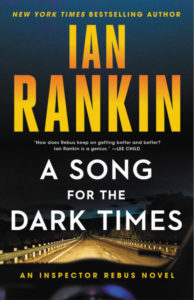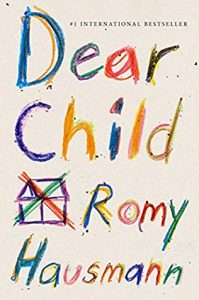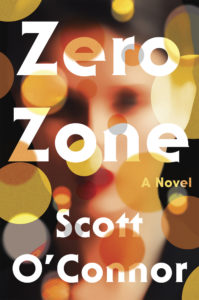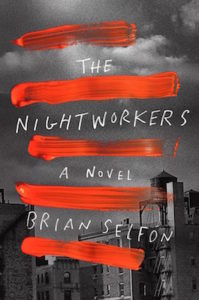Tana French’s The Searcher, Elizabeth Hand’s The Book of Banners and Lamps, and Lincoln Michel and Nadxieli Nieto’s new collection, Tiny Nightmares, all feature among October’s best reviewed new releases.

The Searcher, by Tana French
(Viking)
“… the great power of this suspense story comes from its slow, measured pacing and the intensifying evil of its atmosphere … French’s writing…is eerie and nuanced. Indeed, even though her Dublin Murder Squad series and her other stand-alone mystery, The Witch Elm, have been uniformly excellent, this hushed suspense tale about thwarted dreams of escape may be her best yet. Like the John Ford film it pays homage to, The Searcher is its own kind of masterpiece.”
–Maureen Corrigan (The Washington Post)

Tiny Nightmares: Very Short Stories of Horror, edited by Lincoln Michel and Nadxieli Nieto
(Black Balloon)
“In this masterful anthology, Nieto and Michel bring together 42 chilling works of flash fiction that capture terrors both supernatural and mundane … In fewer than 1,500 words, each of these vivid, visceral tales engages with horrors with striking immediacy. This carefully crafted and genuinely scary collection is sure to impress.”

Snow, by John Banville
(Hanover Square)
“Time and again, Banville sets up and then deftly demolishes the Agatha Christie format he seems to be aping. Everything that seems creakingly familiar about the country-house murder turns out to be darker and darker still … I won’t reveal how the plot thickens. Banville’s depiction of the young republic that Ireland then was (real independence came only in 1937) is fascinating … The book sings with authenticity and Banvillian tropes … Banville is one of the great stylists of fiction in English and Snow allows the limpid cadences of his prose free rein … An entertainment, perhaps, but a superbly rich and sophisticated one.”
–William Boyd (The New York Times)

Still Life, by Val McDermid
(Atlantic Monthly Press)
“McDermid…weaves her plots spendidly. Here she manages to keep one’s interest in both investigations. She juggles them beautifully, and you don’t find yourself wishing she would leave one case and get back to the other. She is also expert at modulating the pace of her narrative. She knows that in a long novel there is a need for quiet patches when the tension is relaxed and her readers, like her characters, can pause to re-charge their batteries … We read crime fiction for enjoyment, comfort and reassurance. McDermid provides all this. She is a writer with a clear sense of right and wrong. In tune with contemporary life, she remains also a moralist. Still Life shows that she is still at the height of her powers; it is deeply enjoyable, one of her best.”
–Allan Massie (The Scotsman)

The Devil and the Dark Water, by Stuart Turton
(Sourcebooks)
“… all about narrative pleasure. In the service of its high-speed, self-aware twists and turns, characters often talk as if they know they’re in a book, and are either nudging a forgetful reader or winking at a complicit one. They’ll undergo heavy-gauge backstory additions to fit them for a reveal or for their next set of tasks and excitements; our idea of the character as we already know them will conflict for a page or two with their new demeanour, then succumb as our sympathies tilt to accommodate. This helps the author convey the emotional charge of each scene in a quick-and-dirty fashion … Events approach at dizzying speeds and recede almost immediately into the distance, decaying into the fog of battle and shipwreck. The locked room murder meets a Michael Bay movie, by way of Treasure Island; you can’t know what’s going on, if only because the author won’t let you know until he’s delivered the final surprise – and another one after that. The effect is irresistible. Turton has got his world up and running inside the first two pages; thereafter, deceptions and diversions multiply until the ultimate, outrageous reveal, at which point the dark water turns out to be rather darker than you imagined.”
–M. John Harrison (The Guardian)

A Song for the Dark Times, by Ian Rankin
(Little Brown)
“The two cases converge in ways that only a writer as talented as Ian Rankin can plot. He weaves a tale that is interesting, suspenseful and timely, and contains references to Brexit, land ownership and xenophobia … a compelling read that will leave you eagerly anticipating the next book in this winning series.”
–Barbara Lipkien Gershenbaum (Bookreporter)

Dear Child, by Romy Hausmann
(Flatiron Books)
“[Hausmann’s] narrative is entirely fresh and original … The novel’s strength is the author’s careful and thoughtful depiction of children as unwitting victims, both of their captivity and the world beyond the perimeter of the only place they’ve known: a house in the woods. Their muted, confused pain is palpable. And indeed, this finely wrought novel actually becomes difficult to read because the author has so expertly rendered the suffering of all its characters … it is the suffering children in Dear Child who propel this captivating novel to its heartbreaking higher ground.”
–Joseph Olshan (The New York Journal of Books)

Zero Zone, Scott O’Connor
(Counterpoint)
“… a sophisticated thriller … O’Connor has constructed the plot of Zero Zone as a kaleidoscope, frequently shattering the chronology of events and remixing the parts. That may sound baffling, but it’s compellingly done — a constant process of filling in context and meaning, solving some mysteries and raising others … One of the challenges of writing fiction about a great artist is how to convincingly create the presence of artistic genius. For instance, if the novel is about a brilliant poet, sooner or later we’ll want to read some immortal verse. If, as in this case, the central character is a famous installation artist, we need to see some of those astonishing sites. Fortunately, O’Connor meets that burden. He provides alluring descriptions of Jess’s famous pieces … I wish O’Connor hadn’t felt it necessary to give Tanner a gruesome skin disease that covers his entire body. At its best, that ‘ugly equals evil’ motif is a remnant of cheap fairy-tale propaganda. At its worst, it’s a pernicious moral equation that perpetuates prejudice against people with disfiguring conditions … Aside from that misstep, though, Zero Zone is an engaging reflection on the function of art and the responsibilities of the artist. Following these characters along their circuitous routes offers a rare chance to consider the risks that great creators take when they try to inspire us to action — but not too much.”
–Ron Charles (The Washington Post)

The Book of Lamps and Banners, by Elizabeth Hand
(Mulholland)
“… a hair-raising, mind-bending trip … Hand does not shy away from bleak, unlikable characters … Hand’s language tightens when Cass spies a detail nobody else notices, but we feel the dead weight of her hangovers and the cranked-up jangle of her nerves. It’s unsettling but impossible to look away as elements line up to set a grim climax in motion … Does this sound impossibly dark? It is! It’s also exquisitely suspenseful, and the paranoia suffusing the story is very much of our present moment. The idea that any single source can make sense of everything happening around us is as alluring as it is dangerous. Half of the mystery in The Book of Lamps and Banners is wondering whether Cass Neary will save us or take us down with her.”
–Heather Seggel (Bookpage)

The Nightworkers, Brian Selfon
(MCD)
“…his hypnotic debut novel, The Nightworkers, unearths not just the gritty mechanics of organized crime but the collateral damage it inflicts on perpetrators and victims alike, damage that outlasts the acts for as long as a lifetime … As in a painter’s pentimento, they peep though the present narrative, subtly revealing the author’s awareness of the world’s cruel ironies. Selfon’s ability to give each character his or her own perspective, desires and demons makes The Nightworkers a resonant work of fiction, one that rises above its crimes to tell bigger truths about family, love and hope.”
–Paula S. Woods (Los Angeles Times)

















